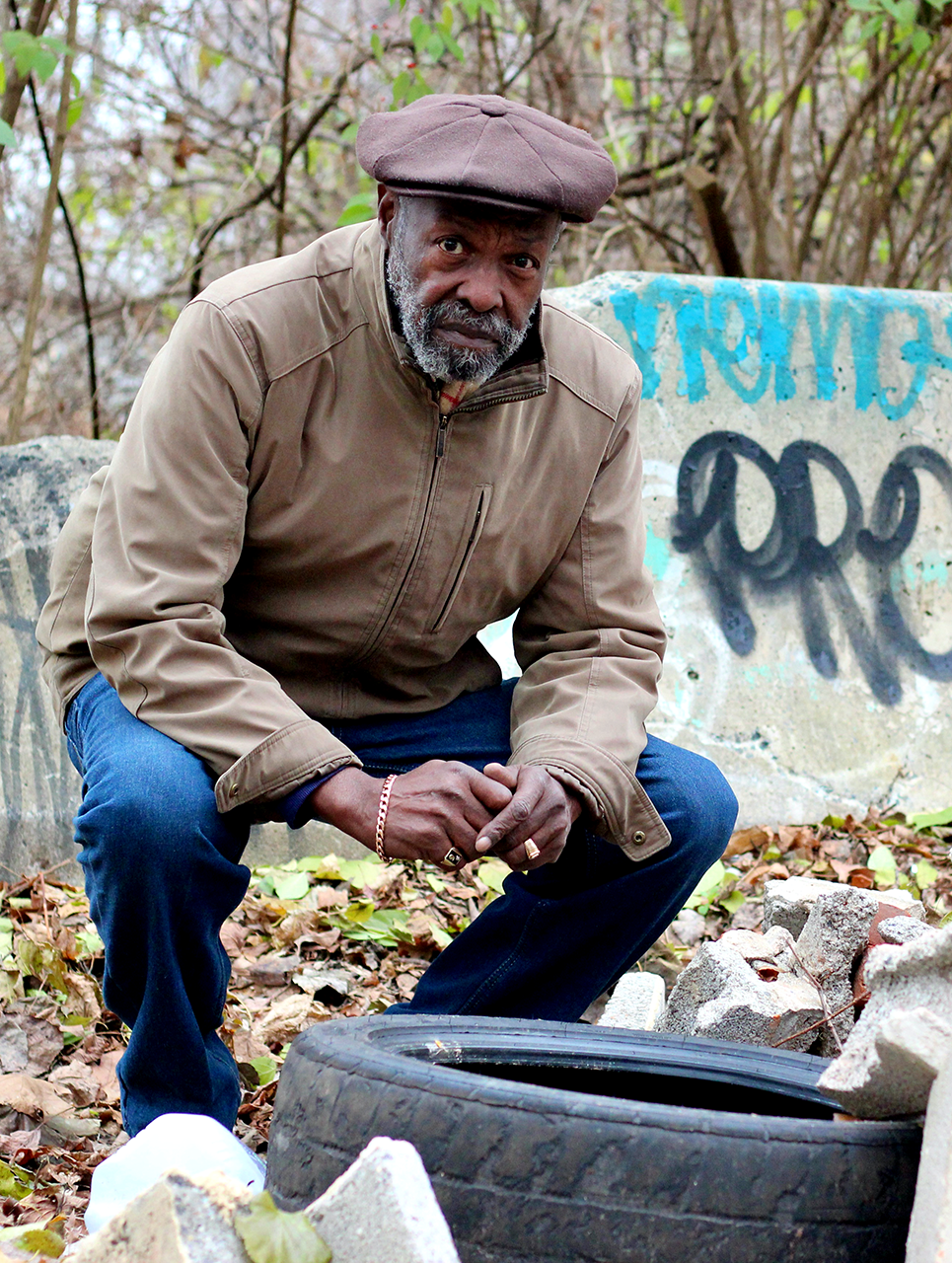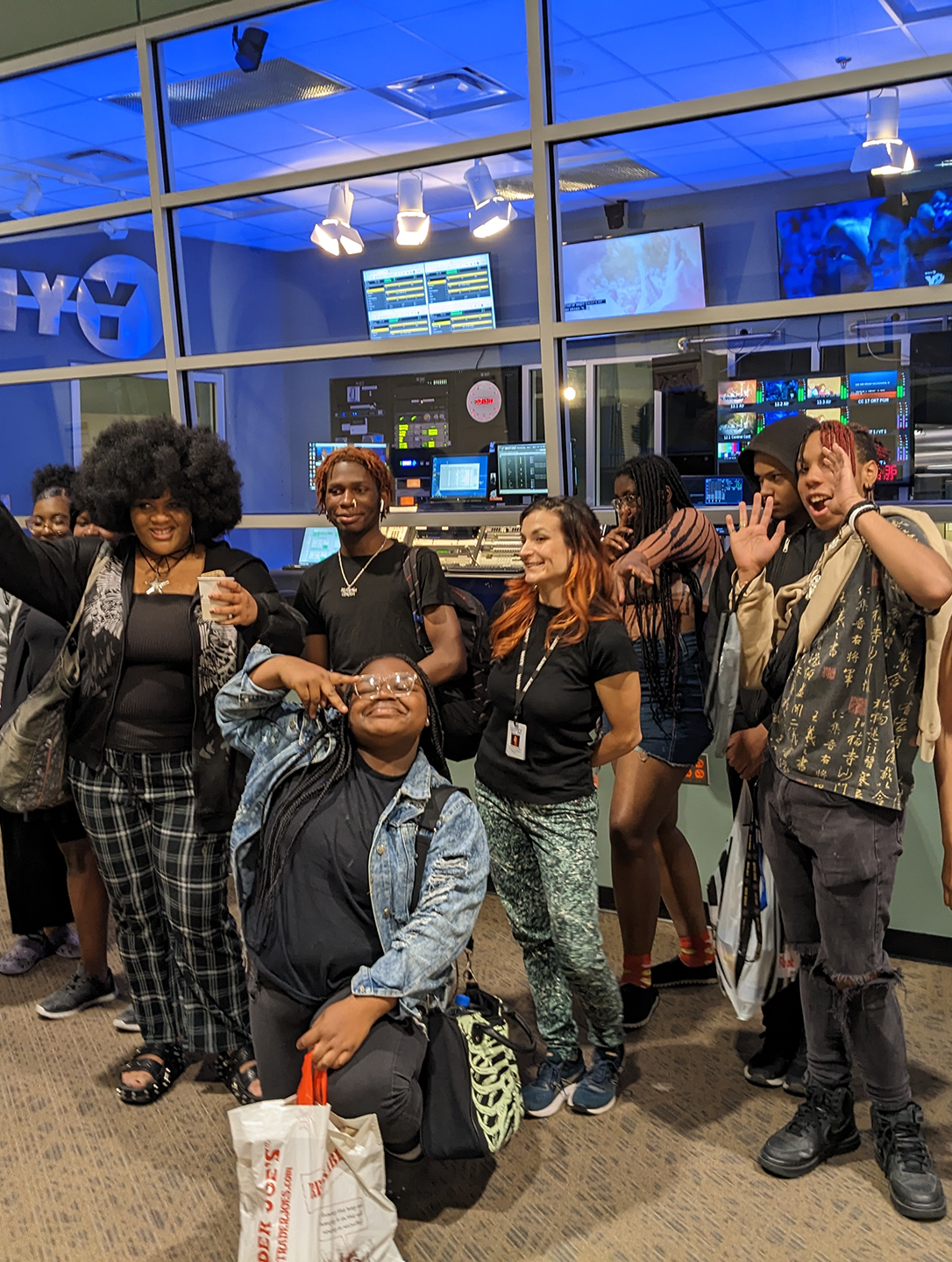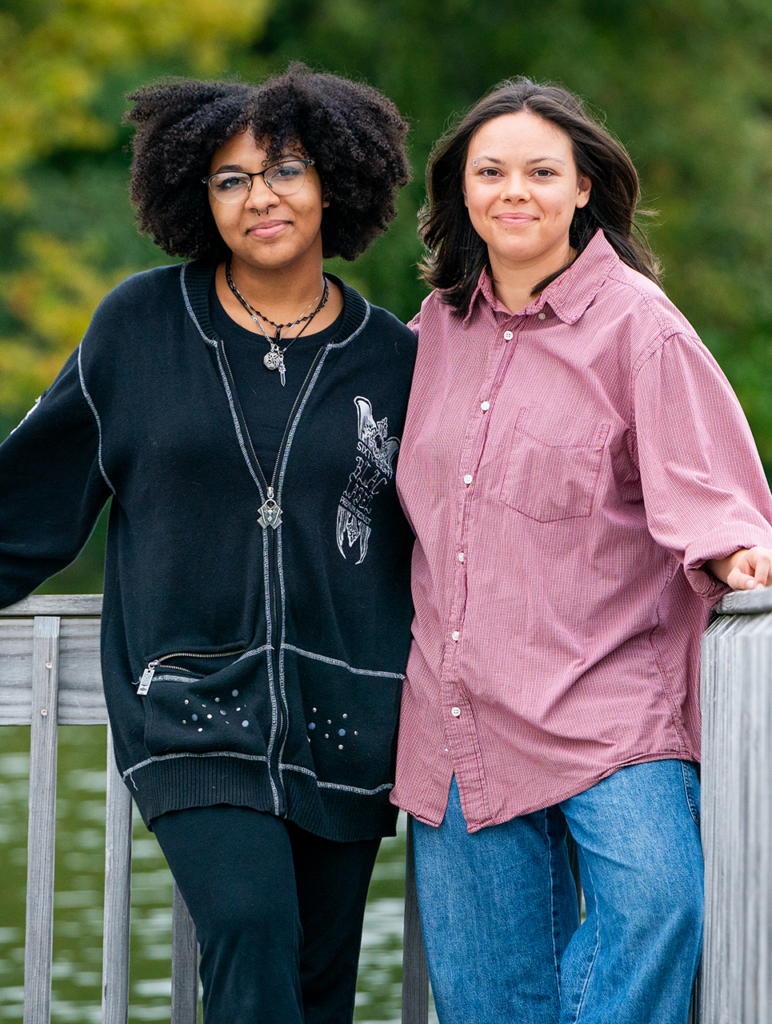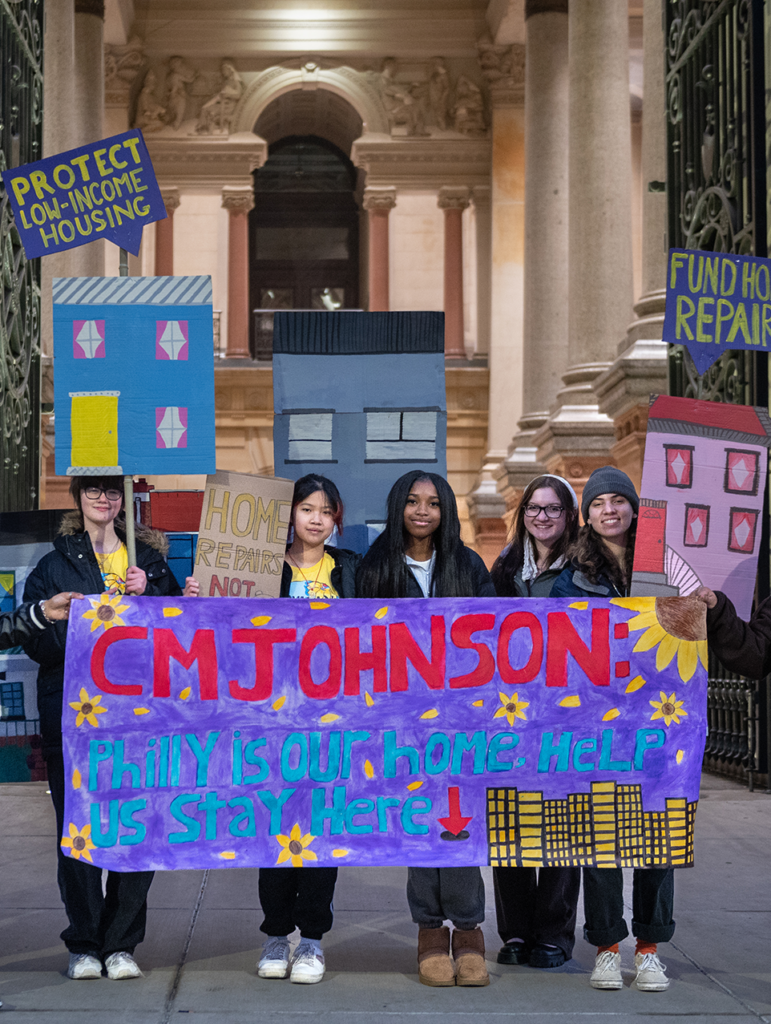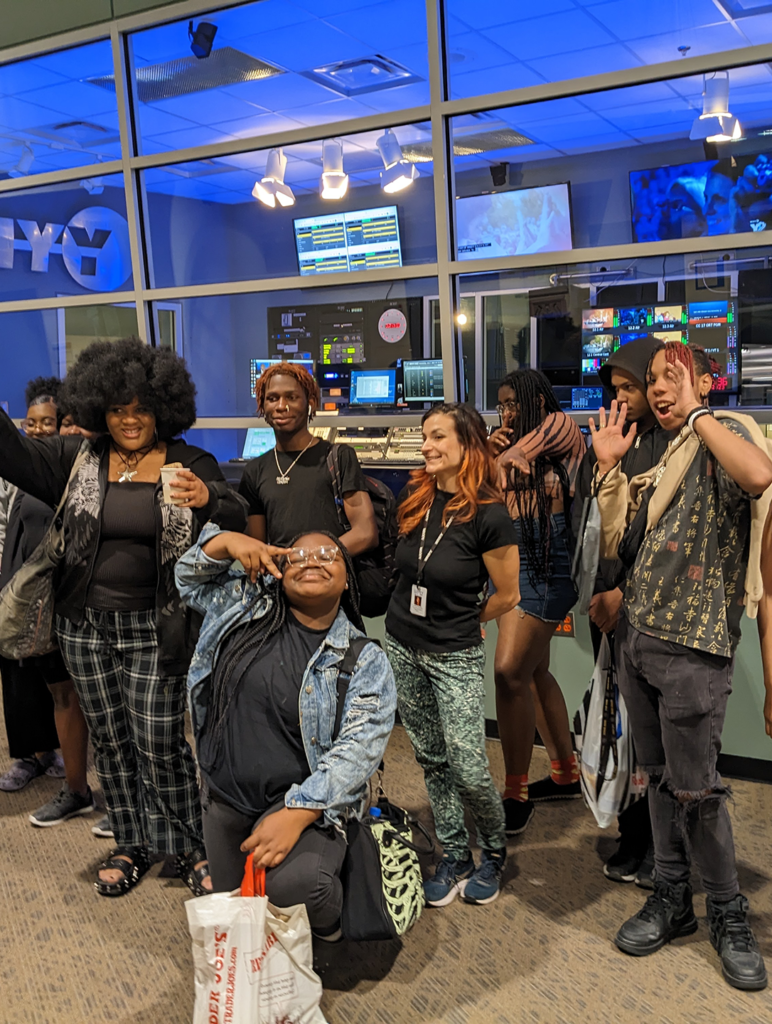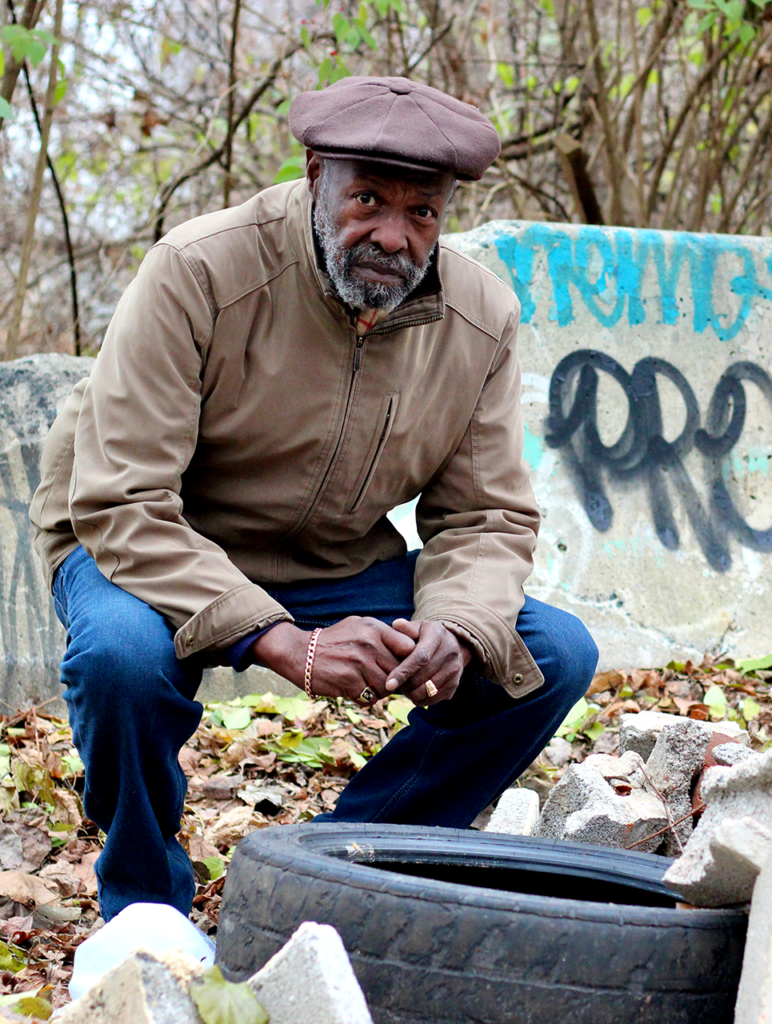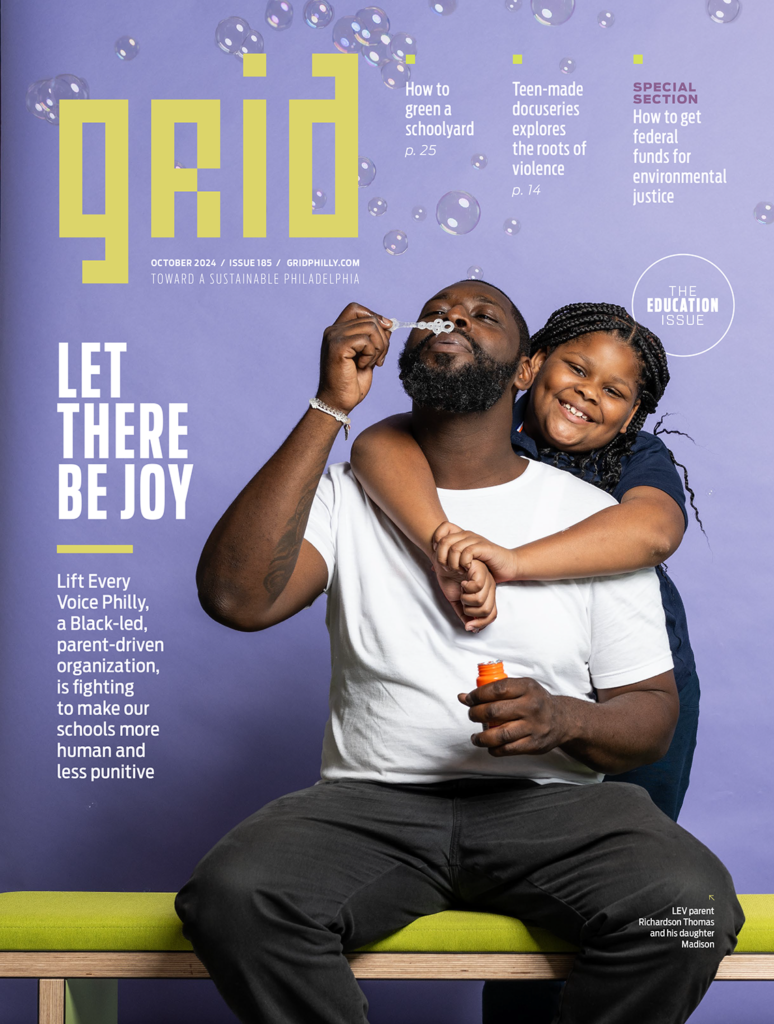On a treeless sidewalk on a day in May that feels much hotter than its 75 degrees, there’s an ice cream truck serving a long line of people, while several plastic machines are cranking out a flurry of bubbles. Some of the bubbles hurtle toward 440 North Broad Street, the headquarters of the School District of Philadelphia. A few dozen women clad in purple Lift Every Voice Philly t-shirts are talking amongst themselves, with assembled media, and sometimes with curious passersby. They are advocating for a new position within the school district: Chief Officer of Joy.
If this sounds like a frivolous request, that impression vanishes when parents and City Council members step up to a lectern and begin outlining their vision.
Lift Every Voice Philly (LEV) is described on its website as a “Black-led, multi-racial organization building parent power to transform Philly schools by advancing racial, economic and education justice.” “Joy” is the center of their current initiative, but it encompasses much more than that.
LEV parent Susan “SuSu” McLeod speaks first. “My daughter, like so many other kids, used to love school, but now she feels like school is a prison where she can’t use the bathroom when she wants to, where she’s bullied and not given support and her recess can be taken away because of the actions of another classmate.”
She continues, “We know that all kids, but especially our poor and Black and Brown kids are suffering inside and out of school, and that has major impacts on learning.”
A second LEV parent, Julie Krug, explains that her son likes math and science and art, but he absolutely loves recess, and he thrives when he can release his energy on the playground. Yet she has seen him have recess taken away for talking in class or not finishing an assignment.
“When my child and others like him are forced to sit for 8 hours a day and cannot have something as basic as movement, they cannot learn,” says Krug.
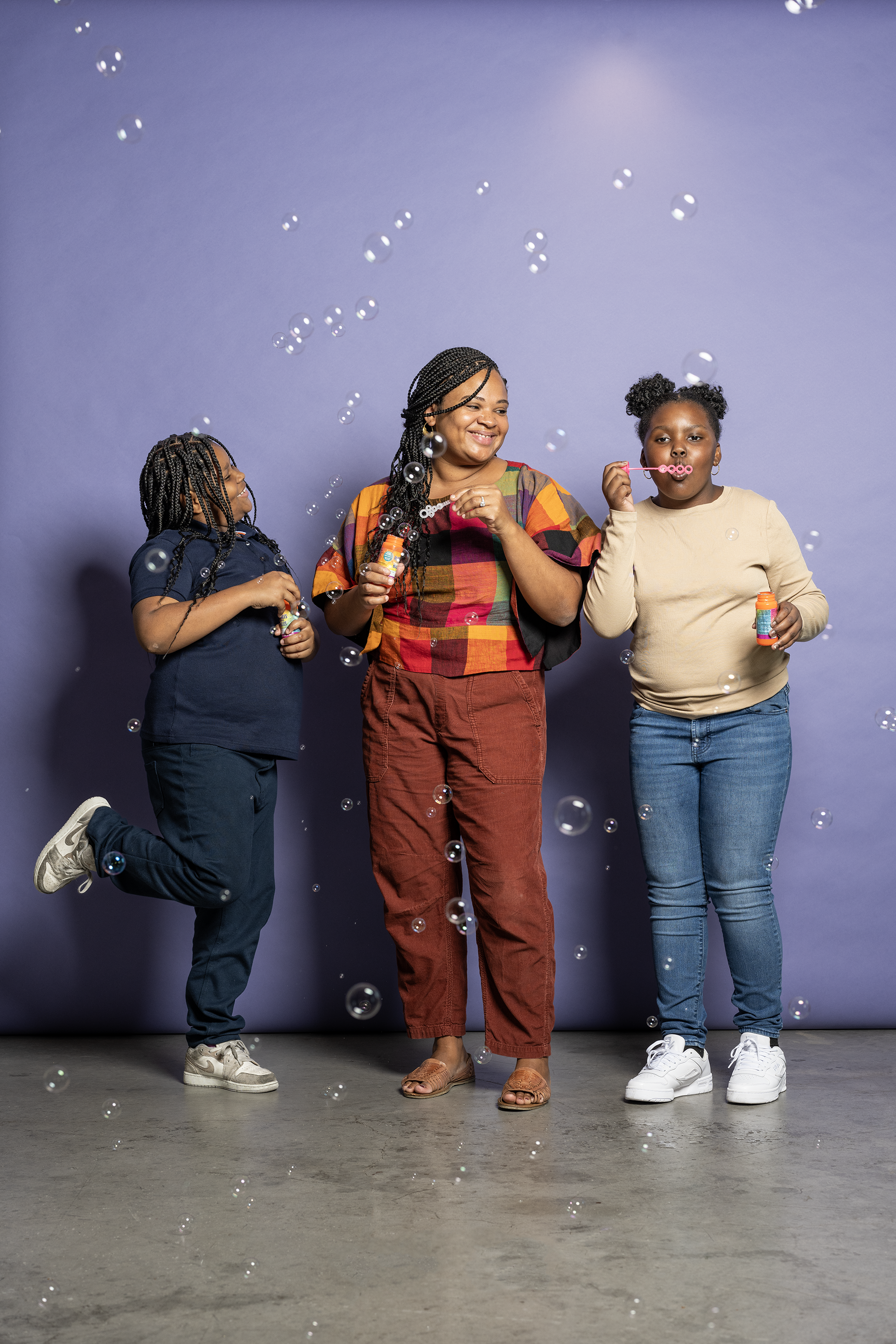
City Councilmember Nicolas O’Rourke speaks next about how boys who look like him are most at risk in this system, and then Councilmember Rue Landau tells a story of when, years ago, she witnessed the teacher in her son’s kindergarten class stop reading to students every time a kid fidgeted or “chewed on their sleeve,” and then single out the offending child, or even remove them from the group. “Your goal is to read to the kids so they can learn to read and all you’re doing is stopping and not making it happen and humiliating the children,” says Landau. “They were 3 months into kindergarten.”
These stories reveal what LEV members believe is at stake: children’s dignity, humanity and bodily autonomy.
Shanée Garner, the executive director and founder of LEV, is happy to let the parents lead the charge. Prior to her current job, she served as Councilmember Helen Gym’s director of policy and legislation for over seven years, and before that she was a teacher at John Bartram High School and Kensington High School. She had recently given birth to her second child, and in the transitional state of being a new parent, Garner began to think about what she wanted to do. She felt like the city lacked a home for parents “to come together and fight together.”
“What we had was a situation where parents were only looking out for their kids, and so I was just like, how cool would it be to have a group of parents as committed to other people’s kids as their own? Who were like, ‘We are centered on values, we care about dignity, we care about collective action. We care about public institutions.’”
While the organization prioritizes schools that serve impoverished neighborhoods, their vision includes reforming schools in the more affluent neighborhoods. They believe that everyone suffers from the same policies, which the group characterizes as anti-Black.
“If I was like, ‘Hey, could you babysit my kid?’ And then you sit him down for 8 hours and give him 12 minutes of stand-up time, it would be unconscionable.”
— Shanée Garner, executive director and founder of Lift Every Voice Philly
One parent from a well-regarded public school complained that their child was only given a 12-minute recess, which shocked Garner.
“If I was like, ‘Hey, could you babysit my kid?’ And then you sit him down for 8 hours and give him 12 minutes of stand-up time, it would be unconscionable. And somehow, when we enter into systems, dehumanization is all of a sudden normal.”
Changing the system, changing themselves
For all the seriousness of LEV’s mission, there certainly is a lot of, well, joy at their headquarters at 3675 Market Street when they meet two weeks after their rally. At a long conference table about twenty women sit. (To date there is only one father in the group, Richardson Thomas, who did not attend the meeting. In a separate interview, he expresses how empowering being in the group has been: “You can do a lot more than what you think, and that’s great.”) Kids are playing in another room while some parents provide childcare. Wes Lathrop, the organizing director, instructs the women to pair off and discuss how they have grown since the campaign began.
After a few minutes of lively conversation, the first parent speaks, and says that she had experienced a lot of unfamiliar emotions that she needed to figure out. She continues, “I also learned that I don’t like rejection. Don’t tell me no!” Clapping and laughter follow.
The next parent to speak says, “I kind of got over my fear of public speaking, and that I actually am good at it.” More encouragement from the group follows.
Lathrop asks the parent, “What would you tell someone new here, who might be afraid of public speaking?”
“I would tell them it’s going to be okay. That, first and foremost, this is one of the safest spaces and communities you are going to find. I would tell them that, although they might have that fear, their story can also be an inspiration for someone else. Your story can be the start, a foundation for someone else.”
Another parent speaks, saying that the group has helped her overcome her tendency to avoid conflict, and allowed her to become, in her words, a disrupter. So when she heard that a classmate of her child had their headphones seized by an overzealous substitute teacher, instead of feeling powerless, as she would have in the past, she had a new reaction.
“As soon as I heard, I reached out to the mother and I was like, ‘How can I support you?’”
She says that she always considered herself a loner, so she was surprised by how much she enjoyed working in a group. Despite feeling anxiety and self-doubt, she found that “the more I pushed myself, the more I was like, ‘You know what? I do have something to say.’”
Kids have noticed the transformations that have occurred in their parents since they started joining. When I’m paired off with Lathrop, he talks about how emotionally powerful it was for him when a child approached him and said, “Thank you for believing in my mom.”
Stori, the daughter of SuSu McLeod, expresses that sentiment as well.
“I’m very proud of her and not only because she has found something that she enjoys. I’m proud of her because she’s found a topic that’s really good for everybody — between kids, between parents, between guardians. It’s really good.”
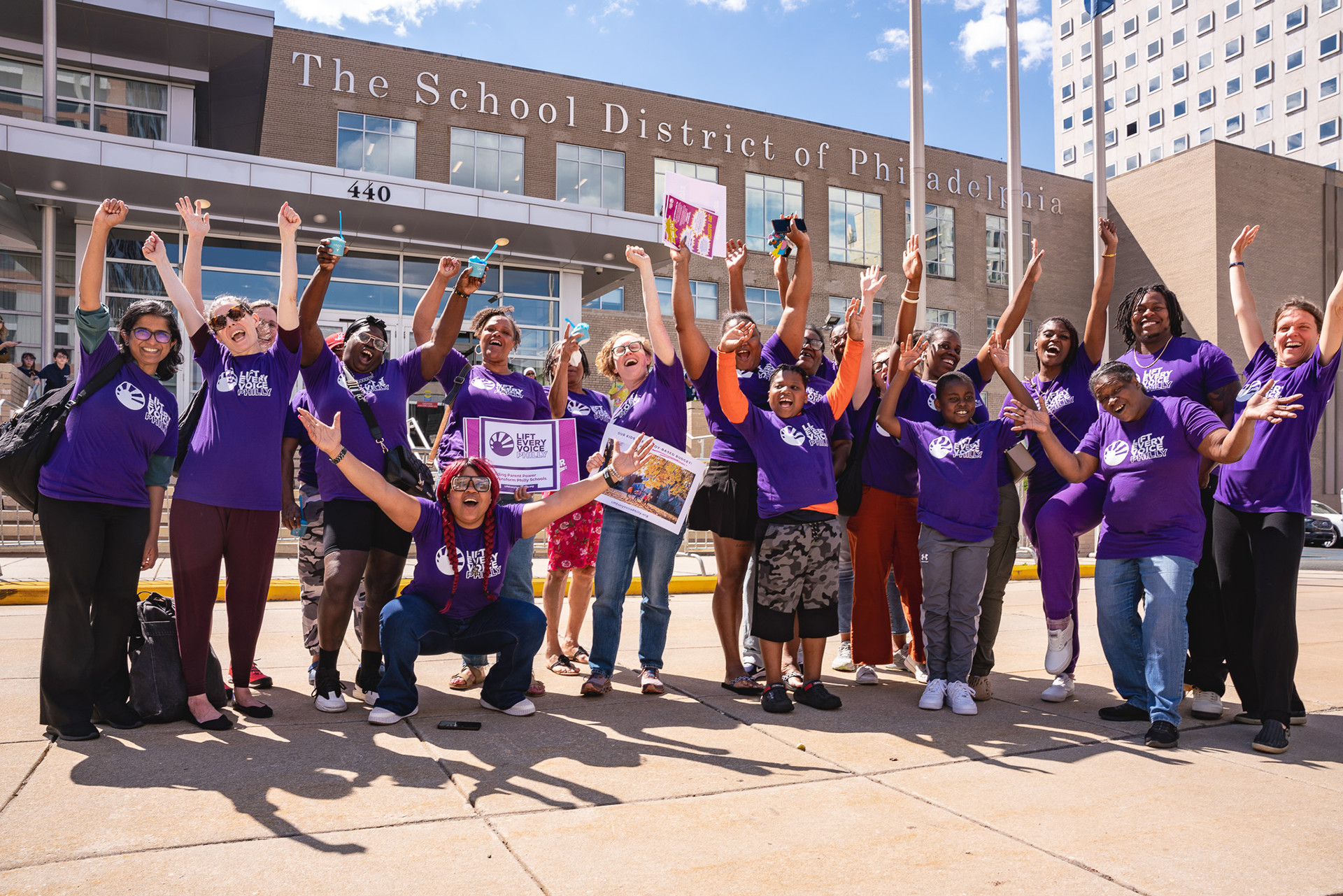
It’s a school, not a prison
City Council has been supportive of Lift Every Voice, and there are two resolutions that have been introduced. One, introduced by Councilmember Landau, proposes that hearings should be held exploring the creation of a Chief of Joy position.
The other, introduced by Councilmember Kendra Brooks, would hold hearings on “exclusionary school discipline and the use of collective punishment practices in public schools.”
When asked to comment on the Joy in School campaign, the School District of Philadelphia, through an email from their communications department, responded: “Joy is one of the core values of The School District of Philadelphia’s five year strategic plan Accelerate Philly. As we implement the plan, we always welcome input from the community with a shared goal of becoming the fastest improving, large urban school district.”
“Joy” is indeed listed as one of the six core values of the district, yet the word can only be found in one other place in the 43 pages of their strategic plan.
When the district addresses some of the same issues that LEV is focused on, it seems to fall under the heading of “school climate,” which is how students perceive their school. In their report they say:
“Fewer than half of student respondents on the annual survey indicated that they consistently feel like they belong at school (36%); feel welcome at school (45%); and enjoy being at school (31%). This is particularly concerning given that there is a strong link between academic achievement and how students feel in school.”
In the fiscal 2023-2024 budget, only $25,000 was allocated to auditing existing school climate programs, compared to the $13.5 million spent on updating security cameras.
Yet in the fiscal 2023-2024 budget, only $25,000 was allocated to auditing existing school climate programs, compared to the $13.5 million spent on updating security cameras. Garner finds this disconnect jarring.
Philadelphia schools have specific and timebound surveillance plans to replace every camera in the district, she says, while there is no equivalent plan to replace toxic buildings.
“That is how you build a prison,” says Garner, “not a school system.”
Garner says that the narrative the school district advances, that parents are partners and joy is a core value, is “100% lip service.”
“We won’t solve our attendance or mental health crisis without … radically changing the way we think about schools and dispelling this idea that only some people have expertise.”
Garner is talking specifically about the expertise of parents. She would like the district to lead, to be the first in the nation to operationalize an education system that listens to families about what children need. They could stop collective punishment and incorporate rest and play in every kid’s school day, she says, and not allow children to be hungry or thirsty, or force them to hold their bladders for extended periods of time.
She realizes that this is an uphill battle.
“For us there are no shortcuts,” Garner says. “We are building power that is durable around a vision that is urgent and inevitable.”
 This content is a part of Every Voice, Every Vote, a collaborative project managed by The Lenfest Institute for Journalism. Lead support for Every Voice, Every Vote in 2024 and 2025 is provided by the William Penn Foundation with additional funding from The Lenfest Institute for Journalism, Comcast NBC Universal, The John S. and James L. Knight Foundation, Henry L. Kimelman Family Foundation, Judy and Peter Leone, Arctos Foundation, Wyncote Foundation, 25th Century Foundation, and Dolfinger-McMahon Foundation. To learn more about the project and view a full list of supporters, visit www.everyvoice-everyvote.org. Editorial content is created independently of the project’s donors.
This content is a part of Every Voice, Every Vote, a collaborative project managed by The Lenfest Institute for Journalism. Lead support for Every Voice, Every Vote in 2024 and 2025 is provided by the William Penn Foundation with additional funding from The Lenfest Institute for Journalism, Comcast NBC Universal, The John S. and James L. Knight Foundation, Henry L. Kimelman Family Foundation, Judy and Peter Leone, Arctos Foundation, Wyncote Foundation, 25th Century Foundation, and Dolfinger-McMahon Foundation. To learn more about the project and view a full list of supporters, visit www.everyvoice-everyvote.org. Editorial content is created independently of the project’s donors.



